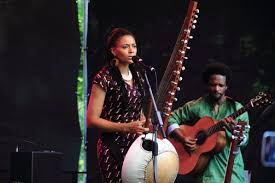
West Africa’s first Female Kora Virtuoso making strives in Music scene
By Ismaila M.S. Naban, The Gambia, for Country Music News International Magazine & Radio Show
Kora
is a 21-string harp built instrument from a large calabash cut in half
and covered with cow skin to make a resonator with a long hardwood neck.
The skin is supported by two handles that run under it.
Each
string of this instrument, from a Mandingo tribe mainly found in the
West African states of The Gambia, Mali, Liberia, Sierra Leone and
Burkina Faso, plays a different note when beat with the fingers.
The
sound of a Kora, it has been noted, resembles that of a harp, though
when played in the traditional style, it bears a closer resemblance to
flamenco and Delta blues guitar techniques of both hands to pluck the
strings in polyrhythmic patterns (using the remaining fingers to secure
the instrument by holding the hand posts on either side of the
strings).
Traditionally, players of this unique musical instrument, are from special families or clans “Jali”(griots)
kunda who are traditional historians, genealogists and storytellers who
pass their skills on to their descendants. The instrument is popularly
found in the West African states of Guinea Conakry, Guinea-Bissau, Mali, Senegal, Burkina Faso and the Gambia.
According
to those familiar with this 21 strings musical instrument, 11 of them
are played by the fingers of the left hand, while 10 by the right.
With
modernisation, some Koras now feature additional bass strings, adding
up to four strings to the traditional 21 which are made from thin strips
of hide, inter alia: antelope skin and nylon fishing line.
While
Kora players have for decades been making their names in the West
African region and beyond the African continent, the arrival of the
first female kora player in to this male-dominated field of music, has
been a surprise to many and continues to attract global attention around
the Gambia’s kora virtuoso, Ms. Sona Jobarteh.
The
outstanding female Kora player hailed from a prestigious West African
Griot family in the small west African nation of The Gambia, dubbed
“Smiling Coast of Africa”.
“Breaking away from tradition, she
is a modern day pioneer in an ancient, male-dominated hereditary
tradition that has been exclusively handed down from father to son for
the past seven centuries.
“Also a lecturer, composer, and
multi-instrumentalist, Sona is one of the most exciting new talents from
the West African Griot tradition to hit the stage in recent years.
“Sona
has an effortless ability to blend musical styles and uses her
innovative stance to talk about issues to do with cultural identity,
gender, love and respect whilst still adhering to and rooting herself
firmly in her traditional cultural heritage,” as stated in her official
page.
The young female musician represents her tradition in a
way that is easily accessible to her audiences from around the world,
who are drawn in by her captivating voice, strong rhythms and catchy
melodies.
Ms. Jobarteh, who had performed in Europe and the
Americas, is not keeping her talents to herself, as she is pioneering
The Gambia Academy of Music and Culture in her native country, The
Gambia, set to be the first cultural centre in The Gambia.
The
rising female star “dedicates a huge amount of her time to this
enterprise and revolves most of her musical career around the
development of this institution.
“Her Academy will offer
unprecedented opportunities to both local and international artists. At
the heart of this institution lie the values of preserving and advancing
tradition, cultural exchange, and what Sona is hugely passionate about:
social development,” it’s been noted.
She has founded the
Junior Department of the Academy 2015 and named it after her late
grandfather and master griot, Amadu Bansang Jobarteh. Since then it has
gained rapid success over the past three years, offering specialist
musical education alongside a full academic curriculum.
“Students
of the school have performed and showcased at numerous national events,
and were recently visited by the President of Germany during his state
visit to the Gambia in December 2017.
“There are 14 members
of staff and 22 students attending the Junior Department, aged between 8
and 18, each carefully selected by Sona for their musical potential.
“Nearly
half the children are orphans and all come from families unable to pay
school fees for their children, so Sona supports the entire school and
its running costs herself. The Africa Festival in Germany has recently
sponsored Sona to pay for the salaries of her school’s local staff for
two years,” her page indicates.
Based on the rapid success of
Sona Jobarteh’s “pilot” Junior School Department, it has been disclosed
that she’s “now well on the way to transitioning into founding The
Gambia’s first Cultural Academy.
“This will be a centralized
hub for the education of both children and adults, national and
international in the areas of study relating to Music and Culture,
whilst also providing social development opportunities for the local
communities.”
Sona and her team are keen to welome volunteers
to teach academic and music studies at the Junior Department. They also
have a senior department, and are keen to connect with people who could
offer advice, expertise, partnerships or contacts for the development of
the Music Department of Sona’s Academy.
Photo (c) Ismaila M.S. Naban, The Gambia